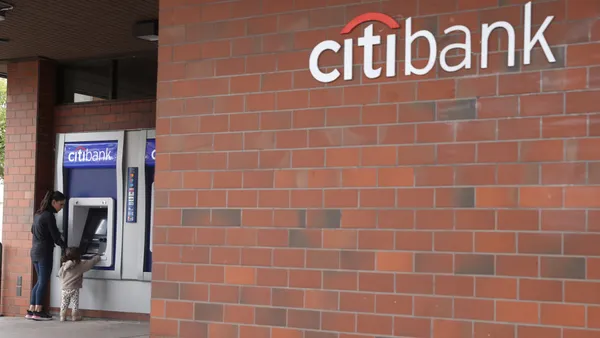Dive Brief:
- Michael Pugh, the CEO and president of Carver Federal Savings Bank, one of the largest Black-owned financial institutions in the country, is stepping down to pursue professional and philanthropic interests, the lender announced Wednesday.
- Craig MacKay has been appointed as the interim president and CEO starting Oct. 1, the New York-based bank announced Monday. MacKay will work closely with Pugh and the senior leadership team to ensure a smooth transition. He has been an independent director of Carver since February 2017.
- Pugh will leave the bank on Sept. 30, to join the Local Initiatives Support Corporation as its new CEO.
Dive Insight:
"It has been the highlight of my career to serve as the President & CEO of Carver. I am proud of the many accomplishments during my tenure," Pugh said in a statement. "I am confident that the Carver Board and management team are well-prepared to fulfill the company's mission and continue to be a significant community development financial institution for years to come."
Carver will aid the bank in its search for a permanent president and CEO, the bank said.
Founded in 1948, Carver opened its door in New York City to serve the African American and Caribbean American communities with limited access to mainstream banking services and business capital, according to the lender.
Pugh joined Carver in 2012 as the chief revenue officer and climbed the ranks to become the chief operating officer the following year. He succeeded Deborah Wright to become CEO in 2015.
Before joining Carver, Pugh held a senior vice president position at Capital One, overseeing around 75 banking centers in the Washington D.C. Metro area, Maryland and Delaware region. He also served as a senior vice president and retail banking executive at Citizens Bank in Indiana and Michigan, where he lead 67 banking centers and supporting departments, according to his LinkedIn profile.
Pugh will join the Local Initiatives Support Corporation as CEO on Oct. 2, overseeing a national network that has invested roughly $30 billion in affordable housing, small businesses, education, health, safety and jobs across the U.S., the group announced Thursday.
LISC was established in 1979 to bridge the gaps in health and wealth and advance racial equity.
"It takes someone with substantial financial and management acumen to effectively connect local programs to national strategies that advance economic opportunity and growth," former U.S. Treasury Secretary Robert Rubin, who has served as LISC board chair for over two decades, said in a statement on Thursday.
"Michael has demonstrated that capacity throughout his career. He is passionate about extending opportunities to people who have not had the chance to fully participate in the American economy. We look forward to him bringing his considerable skills to LISC to help us make a lasting, positive impact,” Rubin added.
Pugh took the helm of the bank at a time when Carver was trying to diversify its business strategy from one that focused on loans and deposits held by nonprofits and faith-based organizations to one that served a broader client base for small business, according to American Banker.
Carver, at the time, recorded losses in six of the previous seven fiscal years. It was also on the verge of being delisted from the Nasdaq stock exchange. Recently, a 2011 cease-and-desist order has been lifted to boost the bank’s tier 1 capital ratio, the outlet reported.
During his tenure at the $720 million-asset bank, Pugh helped grow Carver’s base of assets and investors while digitizing financial products and launching innovative programs catering to the needs of underbanked families and small business owners, predominantly minority and women-owned businesses, the LISC noted.
"Finance is not just about bottom lines. It is a way for people to build a strong future for their families," Pugh said in a statement. "It is about unlocking the opportunity to go to college, buy a home, launch a business, and age with dignity and security. The opportunity to help people create better lives and build assets, and to do so on a transformative national scale, is what attracted me to LISC. I look forward to working with the remarkable LISC team to empower even more people to thrive.”













